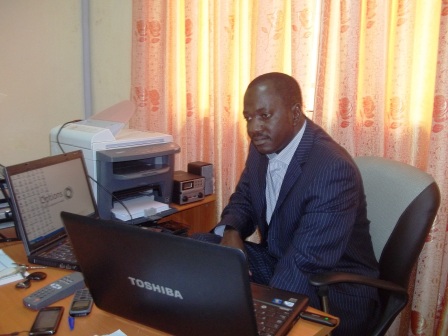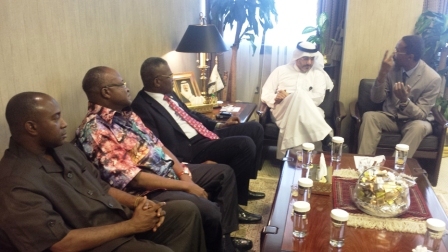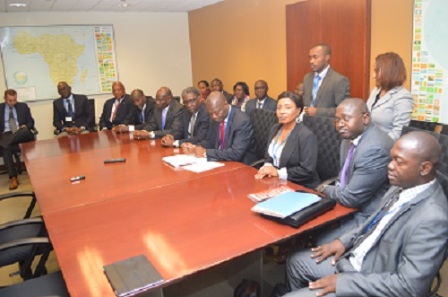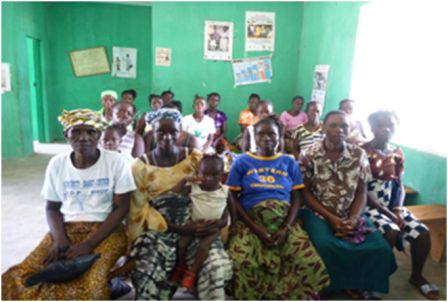Free Health Care: A Pregnant Scheme for Healthcare Systems in Sierra Leone
Sierra Leone is celebrating the third anniversary of the free health care initiative (launched April 27th 2010) which gears towards reducing the unaccepted deaths in the vulnerable groups of women and children. This scheme guarantees free access to healthcare services for the targeted groups of pregnant women, lactating mothers and children below the age of five years. (Photo: Mr Alhassan Fouard Kanu, author)
The Pre-Free Health Care (Fhc) Era
Most of the low-income countries like Sierra Leone were using user-fee for healthcare services. This means patients of all sorts had to finance their health service needs regardless of age and socio-economic status. This was as a result of structural adjustment policies recommended by donors of health delivery services in resource-poor countries.
In 1987, an influential World Bank report about financing of health services recommended user-fee. The proponents of the user-fee suggested that, to charge would have three main benefits. First, fees would generate additional revenue for the health sector. Second, fees would increase efficiency of government health services delivery by reducing what they called “frivolous” demand for services. Lastly, they would improve access of poor people to health services because, revenues from urban services could be used to cross-subsidise disadvantaged people in rural areas. In effect, their argument in a health economics perspectives, suggest that, the user fee would be an appropriate financing mechanisms because they would be effective in raising additional funds; efficient (by encouraging an efficient use of services) and equitable (in benefiting poor people disproportionately).
There is, however, growing evidence showing that user fees reduce usage and this effect is most pronounced in the suppression of demand for health care by poor people. It has been also proved to be inequitable because, poor and vulnerable people have been affected most; both in terms of their reduced use of services and through being impoverished by the effects of high catastrophic health expenditures. In a country where health facilities are very few and located away from remote and poor communities, people who are impoverished face other economic barriers such as transport costs and the opportunity cost of being away from work. The combination of these indirect costs and user fees has often effectively excluded poor people from the formal health care system.
Additionally, findings of a study in 20 African countries acknowledged that, more than 3 million child deaths could have been averted had fees not been charged.
The Pronouncement of Free Health for Women and Children in Sierra Leone
Drawing from the aforementioned lines with regards the challenges faced by healthcare services’ consumers and especially the poorest where healthcare needs are self-financed ; it became justifiable and “common-sensical” for our government to take the bold steps in removing user fees for the targeted beneciaries of pregnant women, lactating mothers and their children below the age of five years.
It was “common-sensical” because the user-fee removal would drastically reduce the death rates in mother and child as well as the untimely deaths and disabilities that occur in the wider population..
Further, the removal of user-fee will be cost-beneficial, and the benefits from any increase use of effective services will outweigh the cost of small losses in fee revenue for the country.
Prior to the introduction of the FHC scheme, Sierra Leone is renowned as a country where children and women (due to childbirth) are dying more than any other country in the world. This has, in the past, shamefully contributed to our bottom position in the Human Development Index. Anecdotal evidence has it that, most of the deaths in our vulnerable women and children are as a result of physical and economic barriers to quality healthcare services.
In April 2010, the country’s political elites, championed by His Excellency, Dr Ernest Bai Koroma offered free health services to the vulnerable groups of women (pregnant and lactating mothers) and children below the age of five years; with support from DFID, World Bank and UN agencies.
The initiation of the FHC scheme is meant to accelerate the reduction of maternal and child mortality rates in the country. The scheme targeted the removal of financial barriers to accessing quality healthcare delivery services for our vulnerable groups of women and children
The aim of the FHC scheme is for up to 230,000 pregnant women, 230,000 lactating women and 1 million children under the age of 5 years to receive free essential health care services every year.
One year after the launch of the initiative; albeit the myriad of challenges, the results were applaudable:
- 1,993,000 additional under 5 consultations (compared to 933,300 in the preceding year), of which 1,160,000 were treated for malaria;
- 126,400, women delivered their babies in a health facility (compared to 87,300 in the preceding year);
- 20,100 maternity complications were managed in health facilities (compared to 8,000 in the preceding year) with a 60% drop in the fatality rate in these cases.
The FHC Scheme: A Pregnant Scheme of Opportunities for the Sierra Leone Healthcare System
The FHC scheme has, albeit few challenges saved the lives of many of our children and women from needless deaths. The scheme has also opened opportunities for the strengthening of our health system.
Notable strategies currently employed in promoting not only the health of women and children but that of the general population is the upgrade of designated Emergency and Obstetric & Neonatal Care (EmONC) facilities. A total of 65 facilities and 13 district government hospitals are being given a facelift to enable them deliver quality health services.
A milestone is being achieved by the MoHS through the Reproductive & Child Health (RCH) Directorate for the effective monitoring of the designated facilities in ensuring their compliance as EmONC facilities. The quarterly monitoring initiative is referred to as Facility Improvement Team (FIT) and it has gone a long way in driving support from our partners who have positively responded to FIT requirements notably the provision of inputs such as equipment, drugs and solarisation of facilities among others.
Whilst at the beginning the FIT was assessing only inputs to these facilities, this has now moved to another stage where the processes are looked into, giving birth to a sub-component of FIT (referred to as FIT mentoring). This component provides on-the-job training of staff on life-saving skills and on evidenced-based and pro-poor strategies in reducing maternal and infant morbidities and mortalities. UNICEF and WHO through the RCH Directorate are providing mentoring and coaching support to facility staff on life-saving skills. This drive is currently changing the picture of our health facilities making them fit-for-the-purpose of delivering quality health services for not only the FHC target groups but for all and sundry that come into contact with these centres.
Performance-Based Financing (PBF) is another strategy for the implementation of the FHC scheme by ensuring clear link between financial resources and the MDG’s outcomes. The performance-based financing mechanism funds healthcare service providers according to the outputs (healthcare service provision) or outcomes (health status of the target population) that they provide. The general objective of the PBF system is to help change the behaviour of health providers at facility level for them to deliver more quality services and to increase their productivity under the free health care policy.
It is expected that the PBF will increase service utilization as well as improving the quality of service delivery at primary health care facility. A well designed PBF system will, in no doubt motivates staff to deliver services in the right places and enables them to access the resources needed to do this
Another strategy was the introduction of remote allowances; targeting health workers living and working in remote and distant communities. This scheme will enhance staff retention and/or their performance. The scheme is currently operational in few districts and there are plans to cover all the districts in the near future.
There are many other opportunities brought in by the FHC scheme such as increasing access to nursing and midwifery schools in the country; and the involvement of communities and civil societies in the monitoring of health deliveries services at all levels of the health systems.
The author would wish to thank the government of Sierra Leone, especially His Excellency the president for the political commitment in making childbirth a peaceful journey and child survival a right in the Sierra Leone.
To our development partners notably DFID, Options Consultancy Services, World Bank, UNICEF, UNFPA, WHO and ADB for their continue support to this life-saving scheme for our women and children in Sierra Leone.
Worthy of applauding is the Director of RCH – Dr SAS Kargbo and his team for the laudable initiatives in promoting quality service delivery and their untiring efforts in ensuring the success of the FHC scheme.
Kudos to the MOHS in their strive to change the indicators that were haunting Sierra Leone before the Free Healthcare.
To all Sierra Leoneans, our support is critical as more lives will be saved with our positive contributions to the scheme.
by Mr Alhassan Fouard Kanu
Stay with Sierra Express Media, for your trusted place in news!
© 2013, https:. All rights reserved.







Sqn Ldr Winston Forde RAF Ret'd
/
The provision of health services accessible to most, and meeting our needs has been a fundamental worry. Over the years it was the case that the lucky and rich travelled overseas, those overseas would not come back because of health care deficiencies, and those living at home did so “by God power!” Thanks to our earlier small band of dedicated Doctors operating in tough times, and our new doctors, and schemes such as this, health care is on the move. It can never be absolutely sufficient, but the direction of travel is very promising. We salute our President, and all those working so hard to deliver…..not just babies, but a great Health Service for all. Well Done, and God Bless.
26th April 2013Yeah right
/
Too bad nothing is free in Salone… Unfortunately free health care is only something talked up in Freetown and to international donors but the worst kept secret is that nothing is free.
26th April 2013Demetrios Perdikis
/
Free Health Care: A Pregnant Scheme for Healthcare Systems in Sierra Leone http://t.co/4sivFnpoHA
26th April 2013